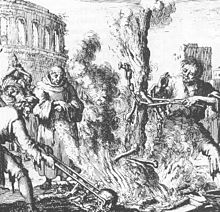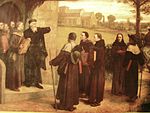Arnold of Brescia
Arnold of Brescia | |
|---|---|
 Monument to Arnold of Brescia in Brescia, Italy (1882). | |
| Born | c. 1090 |
| Died | June 1155 (aged 64–65) |
| Cause of death | Execution by hanging |
| Nationality | Italian |
| Occupation | Canon regular |
| Movement | Proto-Protestantism |
Arnold of Brescia (c. 1090 – June 1155), also known as Arnaldus (Italian: Arnaldo da Brescia), an Italian canon regular from Lombardy,[1] called on the Church to renounce property-ownership and participated in the failed Commune of Rome of 1144–1193.
Exiled at least three times and eventually arrested, Arnold was hanged by the papacy; his remains were burned posthumously and the ashes thrown into the River Tiber. Though he failed as a religious reformer and a political leader,[2] his teachings on apostolic poverty gained currency after his death among "Arnoldists" and more widely among Waldensians and the Spiritual Franciscans, though no written word of his has survived the official condemnation.[3] Protestants rank him among the precursors of the Reformation.[4][5]
Biography
[edit]Born in Brescia, Arnold became an Augustinian canon and then prior of a monastery in Brescia. He criticized the Catholic Church's temporal powers that involved it in a land struggle in Brescia against the Count-Bishop of Brescia. He called on the Church to renounce its claim and return ownership to the city government so as not to be tainted by possession—renunciation of worldliness being one of his primary teachings. He was condemned at the Second Lateran Council in 1139 and banished from Italy.[6]
According to the chronicler Otto of Freising, Arnold had studied in Paris under the tutelage of the reformer and philosopher Pierre Abélard. He approved of Abélard's proposals for monastic reform. The issue came before the Synod of Sens in 1141 and both Arnold and Abélard's positions were overruled by Bernard of Clairvaux.[7] Arnold stood alone against the church's decision after Abélard's capitulation; he returned to Paris, where he continued to teach and preach against Bernard. As a consequence he was then commanded to silence and exiled by Pope Innocent II. He took refuge first in Zürich and then probably in Bavaria.[8] His writings were also ordered burned as a further measure, though that judgement is the only evidence that he had actually written anything. Arnold continued to preach his radical ideas concerning apostolic poverty.

Arnold, who is known only from the vituperative condemnation of his foes, was declared to be a demagogue; his motives were impugned.
Having returned to Italy after 1143, in 1145 Arnold made his peace with Pope Eugene III, who ordered him to submit himself to the mercy of the Church in Rome. When he arrived, he found that Giordano Pierleoni's followers had asserted the ancient rights of the commune of Rome, taken control of the city from papal forces, and founded a republic, the Commune of Rome. Arnold sided with the people immediately and, after Pierleoni's deposition, soon became the intellectual leader of the Commune, calling for freedoms and democratic rights. Arnold taught that clergy who owned property had no power to perform the Sacraments. He succeeded in driving Pope Eugene into exile in 1146, for which he was excommunicated on 15 July 1148. When Pope Eugene returned to the city in 1148, Arnold continued to lead the blossoming republic despite his excommunication. In summing up these events, Caesar Baronius called Arnold "the father of political heresies", while Edward Gibbon later expressed his view that "the trumpet of Roman liberty was first sounded by Arnold."
After Pope Eugene's death, Pope Adrian IV swiftly took steps to regain control of Rome. He allied with Frederick Barbarossa, who took Rome by force in 1155 after a Holy Week interdict and forced Arnold again into exile. Arnold was seized by Imperial forces and tried by the Roman Curia as a rebel. Importantly, he was never accused of heresy. Faced with the stake, he refused to recant any of his positions. Convicted of rebellion, Arnold was hanged in June and his body burnt. Because he remained a hero to large sections of the Roman people and the minor clergy, his ashes were cast into the Tiber, to prevent his burial place becoming venerated as the shrine of a martyr.
In 1882, after the collapse of Papal temporal powers, the city of Brescia erected a monument to its native son.
Beliefs
[edit]Arnold attacked the powers of the Roman Church, and he had a radical zeal to have moral reform in the clergy. Arnold rejected a theocratical state and instead believed that the church and state need to be in complete separation.[9] Arnold believed in "apostolic poverty" and that the church needs to be restored to apostolic purity.[9] The second Lateran council condemned the Arnoldists for denying infant baptism.[10]
Arnold denied the power of the Roman church and believed that sinful clergy lose their right of administering the sacraments.[11]
Some of his critics attacked Arnold for having "offensive views on baptism and the Eucharist".[11]
See also
[edit]Notes
[edit]- ^ Niccolini, Giovanni Battista (1846). Arnold of Brescia: a tragedy. London.
- ^ Greenaway 1931:162.
- ^ The only surviving sources for Arnold's life are Otto of Freising and a chapter in John of Salisbury's Historia Pontificalis.
- ^ Rosalind B. Brooke. The Coming of the Friars (1974) sets Arnold in the broader intellectual history that culminated in the thirteenth-century institutions of the mendicant friars.
- ^ Foxe's Book of Martyrs lists him as a martyr: http://www.ccel.org/f/foxe/martyrs/fox106.htm
- ^ Russell 1992, p. 37.
- ^ Constant J. Mews, "The Council of Sens (1141): Abelard, Bernard, and the Fear of Social Upheaval" Speculum 77.2 (April 2002:342–382).
- ^ Reginald L. Poole, "John of Salisbury at the Papal Court" The English Historical Review 38 No. 151 (July 1923: 321–330) pp. 323ff.
- ^ a b "Philip Schaff: History of the Christian Church, Volume V: The Middle Ages. A.D. 1049-1294 – Christian Classics Ethereal Library". www.ccel.org. Retrieved 2022-02-03.
- ^ Saarnivaara, Uuras (2003). Scriptural Baptism: A Dialog Between John Bapstead and Martin Childfont. Wipf and Stock Publishers. ISBN 978-1-7252-0029-6.
- ^ a b "Catholic Encyclopedia: Arnold of Brescia". www.newadvent.org. Retrieved 2022-02-03.
References
[edit]- Catholic Encyclopedia: "Arnold of Brescia"
- Romedio Schmitz-Esser, Arnold von Brescia im Spiegel von acht Jahrhunderten Rezeption. Ein Beispiel für Europas Umgang mit der mittelalterlichen Geschichte vom Humanismus bis heute, Vienna-Berlin-Münster 2007.
- Romedio Schmitz-Esser, Arnold of Brescia in Exile: April 1139 to December 1143 – His Role as a Reformer, Reviewed, in: Exile in the Middle Ages. Selected Proceedings from the International Medieval Congress, University of Leeds, 8–11 July 2002, ed. by Laura Napran and Elisabeth van Houts, Turnhout 2004, pp. 213–231.
- Russell, Jeffrey Burton (1992). Dissent and Order in the Middle Ages: The Search for Legitimate Authority. Wipf & Stock publishers.
- Arsenio Frugoni, Arnaldo da Brescia nelle fonti del secolo XII (Rome 1954; repr. Turin 1989).
- Grado Giovanni Merlo, La storia e la memoria di Arnaldo da Brescia, in: Studi Storici 32/4 (1991) p. 943–952.
- Maurizio Pegrari (ed.), Arnaldo da Brescia e il suo tempo, Brescia 1991.
- George William Greenaway, Arnold of Brescia, (Cambridge University Press) 1931. The first biography in English.
- Pasquale Villari, Mediaeval Italy from Charlemagne to Henry VII, 1910.
- Ferdinand A. Gregorovius, History of the City of Rome in the Middle Ages 6th ed. 1953–1957.

